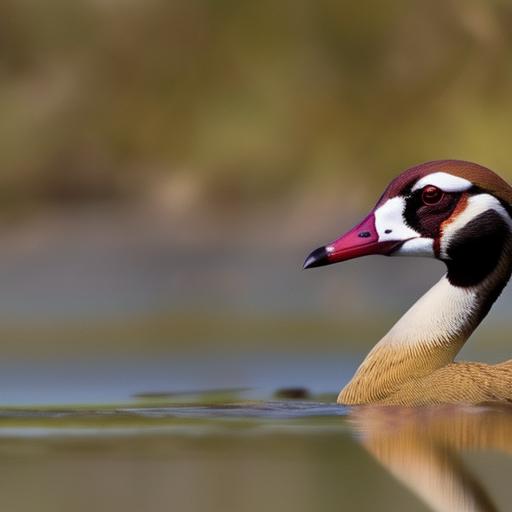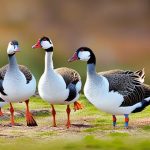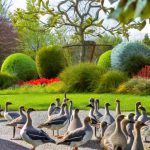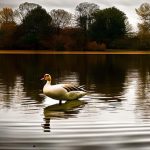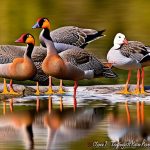The Egyptian Goose, also known as Alopochen aegyptiaca, is a striking and distinctive bird native to Africa. With its chestnut brown body, white wing patches, and a dark eye patch, the Egyptian Goose is a sight to behold. Its long neck and legs give it an elegant appearance, and its honking call adds to its charm. The Egyptian Goose is a monogamous bird, forming strong pair bonds that last a lifetime. They are often seen in pairs or small family groups, and they are known for their strong territorial behavior, especially during the breeding season.
The Egyptian Goose is a species that has been able to adapt to a variety of habitats, including grasslands, savannas, and wetlands. They are also known to thrive in urban areas, making them a common sight in parks and gardens. Their adaptability and striking appearance have made them a popular choice for ornamental bird collections and as pets in some parts of the world. However, their introduction to new environments has not been without controversy, as they have been known to have an impact on local wildlife and ecosystems.
Bringing Egyptian Geese to the UK: The Journey and Adaptation
The Egyptian Goose was first introduced to the UK in the 18th century as an ornamental bird for private collections. Over time, some of these birds escaped or were released into the wild, leading to the establishment of feral populations. Today, the Egyptian Goose is a common sight in the UK, particularly in southern England, where they have adapted well to the climate and landscape. Their ability to thrive in urban areas has also contributed to their spread across the country.
The journey of the Egyptian Goose to the UK has not been without controversy. While some people appreciate their beauty and unique presence, others have raised concerns about their impact on local wildlife and ecosystems. The Egyptian Goose is known to compete with native waterfowl for resources, and their aggressive territorial behavior can lead to conflicts with other bird species. Despite these challenges, the Egyptian Goose has become a familiar and established part of the UK’s avian landscape.
The Delights of Raising Egyptian Geese: Personal Experiences and Joys
Raising Egyptian Geese can be a rewarding and fulfilling experience for bird enthusiasts. Their striking appearance and unique behaviors make them a captivating addition to any collection. Many people who have raised Egyptian Geese have found joy in observing their strong pair bonds and family dynamics. Watching them raise their young and seeing the bonds they form with their human caretakers can be a heartwarming experience.
One of the delights of raising Egyptian Geese is their vocal nature. Their honking calls can be quite entertaining, and they are known to be quite vocal when they are excited or alarmed. Their playful and curious nature also adds to the joy of raising them, as they are often seen exploring their surroundings and interacting with their environment. For many people, the experience of raising Egyptian Geese is a unique and enriching one that brings a sense of connection to the natural world.
The Challenges of Raising Egyptian Geese in the UK: Weather, Diet, and Housing
While raising Egyptian Geese can be a delightful experience, it also comes with its fair share of challenges. One of the primary challenges is providing suitable housing for these birds. Egyptian Geese are known to be territorial and can be aggressive towards other birds, so it is important to provide them with ample space to establish their territory. Additionally, their housing needs to be secure to protect them from predators and the elements.
Another challenge of raising Egyptian Geese in the UK is providing them with a suitable diet. In their natural habitat, Egyptian Geese feed on a variety of plants, seeds, and insects. In captivity, it is important to provide them with a balanced diet that meets their nutritional needs. Additionally, the UK’s climate can present challenges in terms of providing suitable shelter and protection from the weather. Egyptian Geese are adapted to warmer climates, so it is important to ensure that they have access to shelter and warmth during the colder months.
Nurturing Egyptian Geese: Tips for Care and Health Maintenance
Nurturing Egyptian Geese requires careful attention to their care and health maintenance. Providing a balanced diet is essential for their well-being, and it is important to ensure that they have access to a variety of foods that meet their nutritional needs. Fresh water should also be readily available, as Egyptian Geese are known to be fond of swimming and bathing. Additionally, regular veterinary check-ups are important to monitor their health and address any potential issues.
In terms of housing, it is important to provide Egyptian Geese with a secure and spacious enclosure that allows them to establish their territory. Providing them with access to water for swimming and foraging is also important, as it allows them to engage in natural behaviors. Additionally, providing them with suitable shelter and protection from the elements is essential, particularly during the colder months. By providing them with a suitable environment and attentive care, Egyptian Geese can thrive and lead healthy lives in captivity.
Egyptian Geese in the UK: Their Impact on Local Wildlife and Ecosystems
The presence of Egyptian Geese in the UK has raised concerns about their impact on local wildlife and ecosystems. As an introduced species, they have the potential to compete with native waterfowl for resources, which can have implications for the balance of local ecosystems. Additionally, their aggressive territorial behavior can lead to conflicts with other bird species, potentially impacting their populations.
Despite these concerns, some studies have suggested that the impact of Egyptian Geese on local wildlife and ecosystems may not be as significant as initially feared. While they are known to compete with native waterfowl, their impact on other bird species may be limited. Additionally, their adaptability to urban environments may mitigate some of the potential negative effects on local ecosystems. However, continued monitoring and research are important to better understand the implications of their presence in the UK.
Aesthetic Appeal: Egyptian Geese as Ornamental Birds in the UK
The aesthetic appeal of Egyptian Geese has made them a popular choice for ornamental bird collections in the UK. Their striking appearance and unique behaviors make them a captivating addition to gardens and parks. Their elegant posture and vocal nature add to their appeal, making them a charming presence in any ornamental bird collection.
In addition to their aesthetic appeal, Egyptian Geese are also known for their strong pair bonds and family dynamics, which can be a delight to observe. Their playful and curious nature adds to their charm, making them a popular choice for bird enthusiasts. While their presence in the UK has raised concerns about their impact on local wildlife and ecosystems, their aesthetic appeal has made them a beloved addition to many ornamental bird collections.
Egyptian Geese and Human Interaction: Building a Bond and Understanding Behavior
Building a bond with Egyptian Geese requires patience and understanding of their behavior. They are known to be territorial and can be aggressive towards other birds, so it is important to establish trust and respect in their interactions with humans. Providing them with a calm and secure environment can help build a positive relationship, and regular interaction can help them become more comfortable with human presence.
Understanding their behavior is also important for building a bond with Egyptian Geese. They are known to be vocal and expressive, and their body language can provide valuable insights into their mood and intentions. By observing their behavior and responding to their needs, it is possible to build a strong and meaningful bond with these captivating birds. Building a bond with Egyptian Geese can be a rewarding experience that deepens the connection between humans and the natural world.
Conservation Efforts: Protecting and Preserving Egyptian Geese in the UK
Conservation efforts for Egyptian Geese in the UK are focused on protecting and preserving their populations while minimizing their impact on local wildlife and ecosystems. Monitoring their populations and behavior is important for understanding their presence and potential implications for local ecosystems. Additionally, research into their diet and habitat preferences can help inform conservation strategies and management practices.
Conservation efforts also involve raising awareness about the importance of responsible ownership and care for Egyptian Geese. Providing guidance on suitable housing, diet, and health maintenance can help ensure the well-being of captive populations. Additionally, promoting responsible interactions with wild populations can help minimize potential conflicts and mitigate their impact on local wildlife. By working together to protect and preserve Egyptian Geese in the UK, it is possible to ensure their continued presence while maintaining the balance of local ecosystems.
The Rewards and Responsibilities of Raising Egyptian Geese in the UK
Raising Egyptian Geese in the UK comes with both rewards and responsibilities. Their striking appearance and unique behaviors make them a captivating addition to ornamental bird collections, and their strong pair bonds and family dynamics can be a delight to observe. However, it is important to be mindful of their impact on local wildlife and ecosystems, and to provide them with suitable care and housing to ensure their well-being.
By understanding their behavior and needs, it is possible to build a strong bond with Egyptian Geese and provide them with a fulfilling and enriching life in captivity. Conservation efforts are important for protecting and preserving their populations, and promoting responsible ownership and interactions can help minimize their impact on local wildlife. By working together to raise and care for Egyptian Geese in the UK, it is possible to enjoy their beauty and presence while maintaining the balance of local ecosystems.
Meet Walter, the feathered-friend fanatic of Florida! Nestled in the sunshine state, Walter struts through life with his feathered companions, clucking his way to happiness. With a coop that’s fancier than a five-star hotel, he’s the Don Juan of the chicken world. When he’s not teaching his hens to do the cha-cha, you’ll find him in a heated debate with his prized rooster, Sir Clucks-a-Lot. Walter’s poultry passion is no yolk; he’s the sunny-side-up guy you never knew you needed in your flock of friends!

